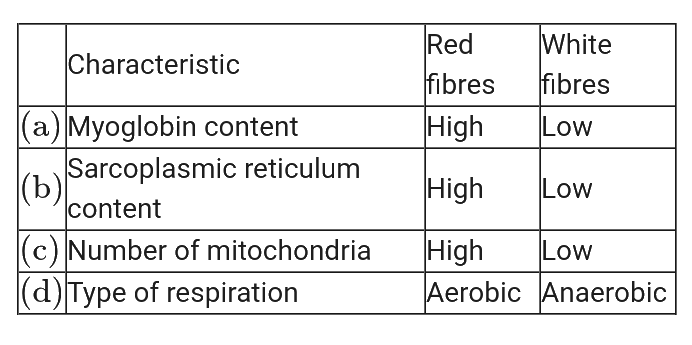Muscle fibres and neurons of body are less sensitive to the radiations. Why?
Step-by-Step Solution:
1. Understanding Radiosensitivity:
- Radiosensitivity refers to the relative susceptibility of cells, tissues, and organs to the harmful effects of ionizing radiation. It indicates how sensitive a particular type of cell is to radiation damage.
2. Effects of Ionizing Radiation:
- Ionizing radiation can cause damage to DNA, leading to mutations. These mutations can result in harmful effects, including diseases such as cancer.
3. Characteristics of Muscle Fibers and Neurons:
- Muscle fibers and neurons are classified as permanent cells. They are typically in a dormant or non-dividing state, meaning they do not undergo frequent cell division.
4. Impact of Cell Division on Sensitivity:
- Cells that are actively dividing are more sensitive to radiation because radiation can disrupt the process of cell division, leading to cell death. In contrast, since muscle fibers and neurons are not rapidly dividing, they are less affected by radiation.
5. DNA Repair Mechanism:
- When dormant cells like neurons and muscle fibers are exposed to radiation, they may experience single-strand breaks in their DNA. However, these cells have the ability to repair themselves effectively. After repair, the DNA can return to its original state, thus minimizing the impact of the radiation.
6. Conclusion:
- Because muscle fibers and neurons are permanent cells that do not divide frequently, they are less sensitive to radiation compared to other rapidly dividing cells. This reduced sensitivity is due to their ability to repair DNA damage and the lack of immediate effects on cell division.
---
- Radiosensitivity refers to the relative susceptibility of cells, tissues, and organs to the harmful effects of ionizing radiation. It indicates how sensitive a particular type of cell is to radiation damage.
- Ionizing radiation can cause damage to DNA, leading to mutations. These mutations can result in harmful effects, including diseases such as cancer.
- Muscle fibers and neurons are classified as permanent cells. They are typically in a dormant or non-dividing state, meaning they do not undergo frequent cell division.
- Cells that are actively dividing are more sensitive to radiation because radiation can disrupt the process of cell division, leading to cell death. In contrast, since muscle fibers and neurons are not rapidly dividing, they are less affected by radiation.
- When dormant cells like neurons and muscle fibers are exposed to radiation, they may experience single-strand breaks in their DNA. However, these cells have the ability to repair themselves effectively. After repair, the DNA can return to its original state, thus minimizing the impact of the radiation.
- Because muscle fibers and neurons are permanent cells that do not divide frequently, they are less sensitive to radiation compared to other rapidly dividing cells. This reduced sensitivity is due to their ability to repair DNA damage and the lack of immediate effects on cell division.
Topper's Solved these Questions
- ENVIRONMENTAL ISSUESBook:ICSEChapter:ENVIRONMENTAL ISSUESExercise:PRACTICE QUESTIONS (VERY SHORT ANSWER TYPE QUESTIONS)
Explore 27 Videos
- ENVIRONMENTAL ISSUESBook:ICSEChapter:ENVIRONMENTAL ISSUESExercise:PRACTICE QUESTIONS (SHORT ANSWER TYPE-I QUESTIONS)
Explore 6 Videos
- ECOSYSTEMSBook:ICSEChapter:ECOSYSTEMSExercise:COMPETITION CORNER (ASSERTION AND REASON TYPE QUESTIONS (FOR AIIMS ASPIRANTS))
Explore 14 Videos
- EVOLUTIONBook:ICSEChapter:EVOLUTIONExercise:COMPETITION CORNER (Assertion and Reason Type Questions (For AIIMS aspirants))
Explore 26 Videos
Similar Questions
Knowledge Check
Assertion: Muscle fibre is a syncitium.
Reason: Muscle fibre has a large number of parallelly arraaged myofilaments in the sarcoplasm.AIf both assertion and reason are ture and reason is the corect explanation of assertionBIf both assertion and reason are ture but reson is not the correct explanation of assertionCIf assertion is true reason is falseDIf both assertion and reason are false
Red muscle fibres are rich in
View SolutionFollowing are given differences between red muscle fibres and white muscle fibres. Which of them is / are incorrect ?

View SolutionThe brief contraction of all the muscle fibres in a motor unit in response to a single action potential in its motor neuron is called
View SolutionRed muscle fibres can be distinguished from white muscle fibres as the former have
View SolutionRed muscle fibres can continue contracting for prolonged durations without fatigue. Why?
View SolutionMuscle fibres having rounded ends are
(a) Unstriped muscles
(b) Smooth muscles
(c) Striped muscles
(d) All the above
View SolutionA skeletal muscle fibre is
View Solution

